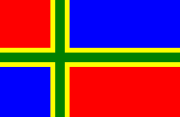Folkspraak
| Folkspraak | |
|---|---|
 |
|
| Created by | Collaborative work |
| Date | 1995- |
| Users | small internet-based groups (date missing) |
| Purpose | |
| Sources | Vocabulary, phonology and grammar from Germanic languages |
| Language codes | |
| ISO 639-3 |
None (mis) |
| Glottolog | None |
Folkspraak (also Folksprák and Folksprak; from folk 'people' and spraak 'language', meaning "the language of the people") is an incompletely developedzonal constructed language based on Germanic languages and intended to be easy to learn for any native speaker of a Germanic language, making it suitable to be a sort of lingua franca amongst the Germanic languages community.
The name Folkspraak has also been used in a more general sense to refer to the entire modern Pan-Germanic language collaboration.
The project's development takes place mostly online in a Yahoo group, though disagreements about grammar and orthography means that there are several different versions or "dialects". Disagreement occurs even over which source languages to use, so that only some developers draw from Frisian, Low German and Norwegian Nynorsk, next to the usual source languages of English, Dutch, German, Danish, Norwegian Bokmål, and Swedish.
The idea behind the project is that a speaker of a Germanic language should be able to read and understand Folkspraak in a week and to write it in a month.
The development of the language is similar in its process to Interlingua—to create a word or a grammatical form in Folkspraak samples are taken from all of the Germanic languages and the form common to most of the languages is selected. Reference is also made to previously existing and parallel Germanic zonal constructed languages.
Due to the splits and rifts in Folkspraak, numerous independent projects and "dialects" have arisen.
Middelspraak (also seen as Middelsprake) is a constructed language designed by Ingmar Roerdinkholder, who later became a member of the effort to develop Folkspraak. Middelspraak ended up very similar to Folkspraak, and as such is often considered a dialectal variant. The main differences between the two are in spelling and phonology, Middelspraak being more archaic, and Folkspraak being more contemporarily focused and simple.
...
Wikipedia
